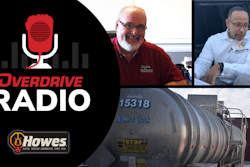There's a self-motivating aspect of engagement with real-time business information, says Overdrive contributor and owner-operator business coach Gary Buchs in the video above. The task of bookkeeping is best done day by day, rather than months in arrears. Playing bookkeeping "catch-up doesn't work really well," Buchs said. Say you're behind and you go back and work on recording January's numbers, for instance, "does that give you anything you can use today?"
Rather, to catch up, he's found, it's best to "do last week first, and go back from there. If you do it that way, you gain a reward psychologically, because you're looking at current information." Take your most recent week and record costs and revenues, then track back another week, then another. That will give you actionable intelligence about your recent business performance. And as Red Eye Radio host Eric Harley emphasizes, it's a way to climb Everest one hill at a time -- to make a seemingly impossible task achievable.
The video above excerpts Harley's roundtable conversation at the 2023 Mid-America Trucking Show with owner-op business coach and Overdrive contributor Gary Buchs, ATBS' Mike Hosted, and Overdrive Editor Todd Dills about the Partners in Business Overdrive/ATBS coproduction.

Catch more in the video. The full talk can be heard via Red Eye Radio's "Extra Mile" podcast or via the Overdrive Radio podcast at this link Find brief excerpts from the talk in the eight-video playlist below.
Owners looking for additional business tips, among a myriad of other topics, can find more in the Overdrive/ATBS-coproduced "Partners in Business" manual for new and established owner-operators, a comprehensive guide to running a small trucking business. Click here to download the updated 2023 edition of the book free of charge.
Gary Buchs: You find a lot of truckers, they're behind on bookkeeping, whether they don't send it in or they're trying to do it in a different system than ATBS or whatever. And they'll say, “I got to catch up my bookkeeping.” What I've learned is, and this is through my own personal experience, playing catch up doesn't work really well because what do we do when we catch up? We go back to, “man, I got to do like last January.”
OK. You do last January. Does that really give you anything you can use today, this week in your truck? Not really.
So what I teach them is do last week first, and work backwards in your bookkeeping rather than catch up from the oldest work. And then when you complete this week, you do last week. Then you go back where you left off and you do another. Set an example of do like three weeks or four weeks at a time, maybe.
And make those entries or get those in. If you do it that way, you gain a reward psychologically because you are looking at current numbers, if that makes sens-e.
Like Mike talked about -- the real-time. … Real time information is a motivator. It has meaning, and that's a big, big part of the problem. So there's a business tip, whatever you want to call it, for someone. If they're struggling with the motivation, that actually will provide a self-motivating, that's a self-motivating tool.
Eric Harley: Sure. And in going through that too, one thing that I've learned is that I don't have to climb the Everest. I can break it down into small hills along the way and say, OK, I can take a week or two with this and say, these are the hours I'm going to dedicate to that and then do it like it's my job because it really is. But at my job, I'm expected to show up on time, so then I'm going to dedicate some time to it. When am I going to do that? What times are best? When am I best suited for that? And when is my mindset best in the day?
All right. 10:00 AM on Tuesday, Wednesday and Thursday I'm going to go into the home office, I'm going to sit down and these are the steps I'm going to take on each day. That way you don't have to climb that Everest, because I think that's part of the procrastination is that it does grow into an Everest in your mind. It's not really an Everest because you can get it done, but it becomes something where people put it off because it's getting bigger and bigger.
Gary Buchs: You get that anxiety. And that's a shutdown effect.
Eric Harley: And that creates the bigger mountain to climb, the bigger hurdle.










